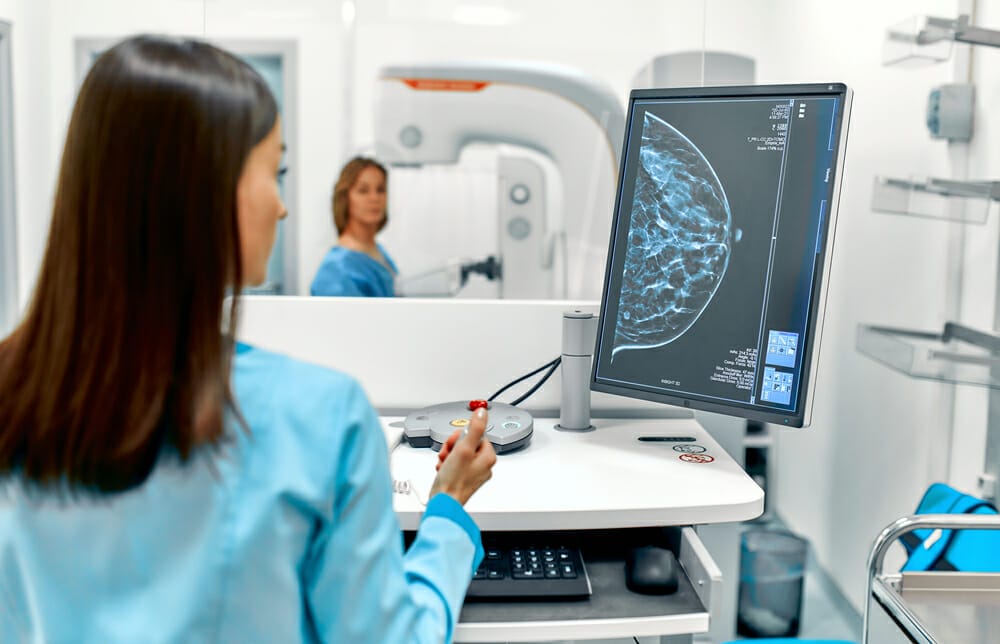Approximately 1 in 7 women in the UK will develop breast cancer at some point in their lifetime.
Regular screening is especially important for your breasts; catching breast cancer early gives you a better chance of beating it.
This guide aims to help you understand the importance of early detection and screening of your breasts so that you can put your health first.
What is breast cancer?
Breast cancer is a type of cancer that occurs when cells in your breast tissue grow uncontrollably. These cells can form a tumour, invading nearby tissue or spreading to other parts of the body.
In the UK, breast cancer is the most common cancer among women, with about 55,200 new cases diagnosed every year.
Breast cancer can affect women of all ages, though the risk of developing breast cancer increases with age, with most cases occurring in women over 50.
While it is more common in women, men can also develop breast cancer, although it is much rarer, with male breast cancer cases making up 1% of the total diagnosed each year.
Why is early detection important?
If breast cancer is detected early, there is a much higher chance that it can be treated successfully.
You may also have more treatment options. For instance, your doctor may offer radiation therapy, chemotherapy and other targeted therapies. When caught early, the treatment for breast cancer may be less aggressive than when it is advanced.
Mammograms: what to expect
There are several different types of screening tests for breast cancer. However, mammograms are the most common screening test and doctors recommend them for most women.
A mammogram is an X-ray of your breast that detects changes in the breast tissue that may indicate cancer. During a mammogram, the mammographer compresses your breast between two plates and takes an X-ray. The procedure can be uncomfortable, but only takes a few minutes to complete.

Studies show mammograms to be highly accurate at detecting breast cancer, with a sensitivity of 63% to 98% for detecting breast cancer in women. Mammograms can also ‘see’ breast cancer at an early stage, which is crucial for successful treatment.
However, mammograms are not foolproof and can sometimes miss breast cancers, especially in women with dense breast tissue. In addition, mammograms can lead to false positive results, meaning that the test indicates the possibility of cancer when there is none, causing unnecessary anxiety and additional testing.
Despite these limitations, mammograms are still considered the gold standard for breast cancer screening.
Breast exams: how to perform them and when to see a doctor
There are two types of breast exams: clinical breast exams and breast self-exams.
A doctor or a nurse performs a clinical breast exam, which involves examining the breasts and surrounding tissue for any lumps or abnormalities. They will feel for lumps or changes in the breast tissue during the exam, which may also include examining the armpit area and the area above the collarbone. Clinical breast exams are recommended for women at higher risk of developing breast cancer, such as those with a family history of the disease.
You can perform breast self-exams at home yourself. This involves examining your breasts and surrounding tissue for any lumps or abnormalities.
Women are encouraged to perform breast self-exams regularly, typically once a month, to familiarise themselves with their breasts and help detect any changes that may indicate breast cancer. Breast self-exams can be performed in the shower, in front of a mirror or lying down.
However, the accuracy of breast exams, both clinical and self-exams, is somewhat limited, because they cannot detect all cancers, and smaller abnormalities may be missed.
Biopsies: what they are and what to expect
If a screening test, such as a mammogram, detects an abnormality in the breast, further testing may be needed to determine whether it is breast cancer. The diagnostic process for breast cancer involves a series of tests and procedures, including biopsies.
A biopsy involves the removal of a small sample of tissue from the breast, which is then examined under a microscope to look for cancer cells.
There are several types of biopsies, including:
- Fine needle aspiration biopsy – A thin needle is inserted into the breast to remove a small amount of tissue or fluid for examination.
- Core needle biopsy – A larger needle is used to remove a small core of tissue from the breast.
- Vacuum-assisted biopsy – A specific instrument removes several small samples of breast tissue.
- Surgical biopsy – A surgical procedure performed by a surgeon to remove a breast tissue sample.
Once a breast cancer diagnosis is confirmed, a specialist may perform additional tests to determine the extent of cancer and whether it has spread to other parts of the body. The consultant uses this information to determine the cancer stage and develop the right treatment plan.
Ultrasounds and MRIs: what they can reveal
Cancer specialists can use imaging tests such as ultrasound and magnetic resonance imaging (MRI) to diagnose and detect breast cancer.
Ultrasound uses high-frequency sound waves to create images of breast tissue. It is often used with a mammogram to provide a more detailed picture. In addition, ultrasound can help distinguish between solid masses (which may be cancerous) and fluid-filled cysts (usually benign).
MRIs use a magnetic field and radio waves to create detailed images of your breast tissue. These are usually performed as diagnostic tests when other imaging tests have produced inconclusive results or to provide more detailed information about the size and location of a tumour.
If imaging tests suggest the presence of cancer, a biopsy may be performed to confirm the diagnosis.
Breast cancer treatment options
Breast cancer treatment depends on the stage and characteristics of the cancer, as well as your overall health and preferences.
Surgery
Surgery is the primary treatment for most early-stage breast cancers. The most common type of surgery is a lumpectomy, which involves removing the cancerous tissue and a margin of surrounding healthy tissue. A mastectomy, which is the removal of the entire breast, may be necessary in more advanced cases.
At The McIndoe Centre, we offer breast reconstructive surgery, which aims to rebuild your breast or breasts after a mastectomy. Breast reconstruction can help you regain your original appearance as much as possible and feel more like yourself again.
Radiation therapy
Radiation therapy uses high-energy radiation to kill cancer cells and shrink tumours. It is often used after surgery to destroy any remaining cancer cells.
Chemotherapy
Chemotherapy uses drugs to kill cancer cells throughout the body. It is typically used in cases where the cancer has spread beyond the breast tissue.
Hormone therapy
Cancer experts use hormone therapy to block the hormones fuelling the growth of certain types of breast cancer. They may use it with other treatments or on its own, depending on the type and stage of the cancer.
Other treatment options may include immunotherapy, which uses your body’s immune system to fight cancer or clinical trials of new and innovative treatments. Consultants develop treatment plans on a case-by-case basis, and you will be involved in the decision-making process to determine the best course of treatment for your needs.
Breast cancer prevention and risk reduction
While there is no guaranteed way to prevent breast cancer, several lifestyle choices and habits may help reduce your risk.
- Maintain a healthy diet – Eating a well-balanced diet rich in fruits, vegetables, whole grains, lean proteins and healthy fats can help maintain a healthy weight and reduce the risk of breast cancer.
- Exercise regularly – Regular physical activity has been linked to a lower risk of breast cancer. Aim for at least 30 minutes of moderate-intensity exercise, such as brisk walking, cycling or swimming, on most days.
- Limit alcohol consumption – If you choose to drink, limit your consumption to no more than one drink a day.
- Avoid smoking – If you smoke, stopping can help reduce your risk.
- Know your family history – Women with a family history of breast cancer may be at increased risk. Talk to your doctor about your family history and whether genetic testing may be right for you.
- Get regular breast cancer screenings – Regular mammograms and breast exams can help detect breast cancer early, when it is most treatable. Talk to your doctor about when and how often you should be screened based on your risk factors.
By following these recommendations and making healthy choices, you may reduce your risk of breast cancer and improve your overall health and wellbeing.
Resources and support: organisations and groups for women with breast cancer
Being diagnosed with or at risk of breast cancer can be tough to deal with alone. But you don’t have to go through it without help. Here are some support groups for women diagnosed with breast cancer or possibly at risk.
- Breast Cancer Haven – Offers free emotional and practical support to anyone affected by breast cancer. It has centres in London, Hereford, Leeds, Wessex, Worcester, West Midlands and Cheltenham.
- Breast Cancer Now – Provides information and support to anyone affected by breast cancer. It offers a free helpline, an online forum and a range of resources, including information on breast cancer diagnosis, treatment and living with the disease.
- Macmillan Cancer Support – Gives practical, emotional and financial support to people affected by cancer. It has various resources and services, including a free helpline, an online community and information on living with cancer.
- Cancer Research UK – Provides information on breast cancer diagnosis, treatment and prevention. It also funds research into the disease and offers resources and support for people affected by cancer.
- Pink Ribbon Foundation – Gives financial support to UK charities that help people affected by breast cancer. It also has a range of resources and information on breast cancer diagnosis, treatment and prevention.
It’s vital to seek support and information to help manage breast cancer’s physical and emotional challenges.
Book a consultation at The McIndoe Centre
Take charge of your health and book a consultation at The McIndoe Centre today. Our team of experts will be with you every step of the way and will discuss your needs to create a personalised service just for you.
News and articles
We offer a range of news and blog articles to enable people to make more informed decisions when it comes to the treatments we have at The McIndoe Centre.





